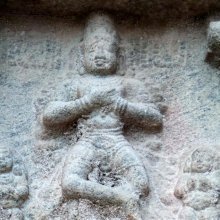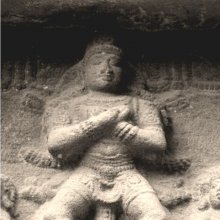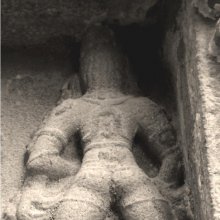Svastika, Su-astika: 32 definitions
Introduction:
Svastika means something in Buddhism, Pali, Hinduism, Sanskrit, Jainism, Prakrit, the history of ancient India, Marathi, Hindi, biology. If you want to know the exact meaning, history, etymology or English translation of this term then check out the descriptions on this page. Add your comment or reference to a book if you want to contribute to this summary article.
Svastika has 32 English definitions available.
Alternative spellings of this word include Swastik.
Images (photo gallery)
(+46 more images available)
Languages of India and abroad
Sanskrit dictionary
[Deutsch Wörterbuch]
Source: Cologne Digital Sanskrit Dictionaries: Böhtlingk and Roth Grosses Petersburger WörterbuchSvastika (स्वस्तिक):—(von svasti)
1) m. eine best. Glück bringende Figur (abgebildet bei [Colebrooke 2, 209] und [BURNOUF,] [Lot. de Lassen’s Anthologie b. l. 625]), überh. Kreuzfigur [Pāṇini’s acht Bücher 6, 3, 115.] svastikārdhavibhūṣitāḥ Schlangen [Harivaṃśa 3934. 4433. 4440.] bhāsvantaṃ svastikenenduvarcasā [5185.] vijñeyā Schiff [Rāmāyaṇa 2, 89, 12. fg.] st. dessen svastikacihnāṅkā [97, 17. fg.] [Gorresio] padmasvastikasaṃsthitaiḥ (gṛhameghaiḥ) [?5, 10, 4. Mṛcchakaṭikā 47, 12. Varāhamihira’s Bṛhajjātaka S. 33, 10. 50, 2. 56, 15. 68, 46. 71. 70, 10. 71, 5. 88, 23. Mārkāṇḍeyapurāṇa 23, 94. Rgva tch’er rol pa ed. Calc. 122, 20. 402, 19. Kunde des Morgenlandes 5, 450. Hemacandra’s Abhidhānacintāmaṇi 47. 1309.] auf einem Globus zur Bezeichnung best. Punkte oder Stellen [GOLĀDHY.] [GOLAB. 56.] Comm. zu [ĀRYABH. 4, 23. 30 u.s.w.] —
2) m. eine Schüssel von best. Form [Mahābhārata 4, 2188. 7, 2930. 12, 1449.] [Rāmāyaṇa 6, 112, 37.] [PAÑCAR. 2, 4, 31.] ein Glück bringender Gegenstand überh. [Hemacandra’s Anekārthasaṃgraha 3, 105.] [Medinīkoṣa k. 166.] —
3) m. eine best. Stellung der Hände (auf der Brust gekreuzt) [Oxforder Handschriften 86,a,33. 202,a,18. 25. fg. b,27] (wohl svastiko hastaḥ st. svastikāhastaḥ zu lesen). hasta dass.: dāna das Kreuzen der Hände [BĀLAR. 75, 16.] svahastasvastikastanī so v. a. mit gekreuzten Händen die Brüste bedeckend [Kathāsaritsāgara 108, 69.] stanavinihitahastasvastikābhirvaghūbhiḥ [MĀLATĪM. 73, 16.] bāhu so v. a. gekreuzte Arme (= aṃsa Schulter [Nīlakaṇṭha]): vinyastapīnahrasvaśirodhara [Mahābhārata 3, 11146.] —
4) n. (sc. āsana) eine best. Art zu sitzen (mit gekreuzten Beinen) [AMṚTANĀDOP.] in [Weber’s Indische Studien.9,30.] [Mārkāṇḍeyapurāṇa 39,28.] [PAÑCAR.3,1,17.] [Oxforder Handschriften 11,a, Nalopākhyāna 1. 94,a, Nalopākhyāna 2. 102,b,12. 16. 234,a,16.] [Vedānta lecture No. 130.] [Kullūka] zu [Manu’s Gesetzbuch.6,49.] svastikāsana [SARVADARŚANAS. 174, 5.] —
5) Kreuzverband (an Brust, Brauen, Ohren, Gelenken) [Suśruta 1, 65, 17. 21. 2, 29, 6.] —
6) m. n. ein Gebäude in Kreuzform [Amarakoṣa 2, 2, 10.] [Hemacandra’s Anekārthasaṃgraha 3, 105.] [Medinīkoṣa k. 166.] [Halāyudha 2, 150.] [Varāhamihira’s Bṛhajjātaka S. 53, 34] (vgl. die Uebersetzung). 36. āyatāścaturasrā vṛttāśca svastikāstathā . prāsādāḥ [Harivaṃśa 8358] (wohl als adj. zu fassen). —
7) m. ein viereckiger Platz (catuṣka) [Hemacandra’s Anekārthasaṃgraha] [Medinīkoṣa] —
8) m. eine Art Gebäck mit vier Zipfeln [?(CAKRAD. zu Suśruta 1,
23) VIŚVA im Śabdakalpadruma Suśruta 1, 107, 6. 2, 535, 9.] —
9) m. eine Art Knoblauch [Trikāṇḍaśeṣa 2, 4, 35.] m. n. eine best. Gemüsepflanze, Marsilea quadrifolia [Rājanirghaṇṭa 4, 50.] [MAD. 7, 55.] —
10) m. Hahn [Hemacandra’s Abhidhānacintāmaṇi 191.] —
11) m. ein Wollüstling [VIŚVA im Śabdakalpadruma] —
12) m. Nomen proprium a) eines Schlangendämons [Mahābhārata 2, 806.] — b) eines Wesens im Gefolge Skanda's [Mahābhārata 9, 2567.] — c) eines Dānava [Harivaṃśa 12937.] — d) eines Mannes [Rgva tch’er rol pa ed. Calc. 357, 10. fgg.]
Sanskrit, also spelled संस्कृतम् (saṃskṛtam), is an ancient language of India commonly seen as the grandmother of the Indo-European language family (even English!). Closely allied with Prakrit and Pali, Sanskrit is more exhaustive in both grammar and terms and has the most extensive collection of literature in the world, greatly surpassing its sister-languages Greek and Latin.
See also (Relevant definitions)
Partial matches: Astika, Cu, Shu.
Starts with (+1): Svastika-cihna, Svastika-patta, Svastikabandha, Svastikadana, Svastikadicakra, Svastikadicakrani, Svastikahasta, Svastikakarna, Svastikakriti, Svastikalinga, Svastikanka, Svastikapani, Svastikapasrita, Svastikara, Svastikarechita, Svastikarecita, Svastikarman, Svastikasana, Svastikataka, Svastikayantra.
Ends with (+6): Adhahsvastika, Adharasvastika, Aparasvastika, Ardhasvastika, Bahusvastika, Cakrasvastika, Chakrasvastika, Diksvastika, Dvisvastika, Hastasvastika, Kartari-svastika, Khasvastika, Mandalasvastika, Mushti-svastika, Mushtikasvastika, Padasvastika, Padmasvastika, Parshvasvastika, Pashcatasvastika, Prakasvastika.
Full-text (+211): Svastikasana, Svastikakarna, Adhahsvastika, Adharasvastika, Aparasvastika, Svastikapani, Hastasvastika, Mushtikasvastika, Ashtamangala, Padmasvastika, Svasti, Nandyavarta, Svastikadana, Matriveshma, Svastikayantra, Svastikanka, Cakrasvastikanandyavarta, Svastikahasta, Svastika-patta, Cuvastikappulli.
Relevant text
Search found 85 books and stories containing Svastika, Su-astika; (plurals include: Svastikas, astikas). You can also click to the full overview containing English textual excerpts. Below are direct links for the most relevant articles:
Chaitanya Bhagavata (by Bhumipati Dāsa)
Verse 1.14.41 < [Chapter 14 - The Lord’s Travel to East Bengal and the Disappearance of Lakṣmīpriyā]
Verse 1.15.101 < [Chapter 15 - Marriage with Śrī Viṣṇupriyā]
Vishnudharmottara Purana (Art and Architecture) (by Bhagyashree Sarma)
2.2. Hand Postures (b): Saṃyukta-hasta < [Chapter 3 - Drama and Dance]
2.2. Hand Postures (c): Nṛtta-hasta < [Chapter 3 - Drama and Dance]
2.5. Karaṇa (movements of legs and hands) < [Chapter 3 - Drama and Dance]
The Agni Purana (by N. Gangadharan)
Chapter 320 - The different mystic diagrams (maṇḍala)
Chapter 68 - Mode of taking out a procession and celebration of festivals
Chapter 294 - The characteristics of different kinds of serpents (nāga-lakṣaṇa)
Gati in Theory and Practice (by Dr. Sujatha Mohan)
Gait of birds and animals < [Chapter 2 - Concept and technique of Gati]
Description of Gati as in Saṅgītamuktāvalī < [Chapter 2 - Concept and technique of Gati]
Gati in classical dance form of Kathak < [Chapter 4 - Practice of Gati]
Trishashti Shalaka Purusha Caritra (by Helen M. Johnson)
Part 2: Description of Kauśāmbī < [Chapter IV - Padmaprabhacaritra]
Part 2: Incarnation as Dharmanātha < [Chapter V - Śrī Dharmanāthacaritra]
Part 23: Conquest of southern half of Bharata by Tripṛṣṭha < [Chapter I - Śreyāṃsanāthacaritra]
Kashyapa Shilpa-shastra (study) (by K. Vidyuta)
7. The Shapes and Embellishments of the Gopuras < [Chapter 5 - Gopura Lakṣaṇa]
Related products






